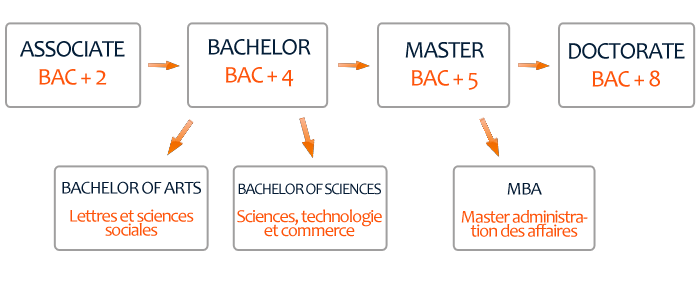Academic studies
2 possible start dates : August or January
In order to be a sophomore being a freshman, 30 credits must be passed regardless of your choice of start date.
Campus life
Housing
American schools require international students to live on-campus for at least one year. Possibility to live off campus after your first two years on campus.
From traditional residence hall rooms to apartment-style living, the University offers a variety of excellent student housing option.
They all offer nicely furnished rooms, air conditioning, cable and wireless internet, common areas, kitchens, washing machines and dryers.
Rooms are usually designed for 2 students. Single rooms are usually not available to incoming students.
Students share large bathroom.
Dormitories are in close proximity to classrooms, cafeteria and sports facilities.
All first-year students are required to enroll in a meal plan.
Food
If you live on campus, students have the opportunity to access Dining Commons for unlimited food and beverage. There is a wide variety of stations with different food options to choose from. In addition to the dining commons, the university may operate campus restaurants to give additional variety, flexibility, and flavor as well as quality retail cafés.
Lunch usually starts from 11 am to 2 pm.
Dinner usually starts from 5 pm to 8pm.
Sport
Sport is an integral part of the American student’s life. Students have every opportunity to practice their favorite sport: sports fields (basketball, tennis, squash), weight rooms, swimming pool, sauna. Everything is at their disposal. In the biggest universities, you’ll have the chance to attend matches close to the professional level.
Activities
On-campus activities range from concerts and theater to movies. The American experience isn’t just about sports. You can also join one of the university’s many associations: choirs, religious groups, charities, theater, sororities and fraternities… There’s no shortage of choice, you just have to find your place.
Diploma and Equivalences
Academic studies
Students study a compulsory general curriculum for the first 2 years, specializing only in the last 2 years. This gives them time to think about what they want to do and choose a career path. Students must pass a minimum of 5 subjects per semester (representing 15 hours of classes per week) to obtain their Bachelor’s degree in 4 years.
What Does a Typical College Freshman Class Schedule Look Like?
FRENCH/AMERICAN DEGREE EQUIVALENCIES
ENIC-NARIC, “European Network of Information Centres – National Academic Recognition Information Centres”. In France, the legal principle of equivalence does not exist. You can obtain a certificate of recognition of your study level. This certificate helps make your course more transparent and can be shown to employers, authorities organizing competitive examinations and training institutions, to assist you in following your chosen path.
Higher education institutions are autonomous in their admissions decisions, some of them may ask you for a certificate of comparability to better understand your academic background abroad.
Generally speaking, however, a Bachelor’s degree in the USA is equivalent to a Licence in France. You will be able to continue your studies at Master’s level in France.
Your American diploma allows you to work in France and anywhere else in the world.
If you began your studies in France, you can enter a Bachelor’s or Master’s program in the USA.
Courses
Arts and Sciences
Actuarial Science, Biochemistry, Biological Science, Biostatistics, Chemical Physics, Chemical Science, Chemistry, Classics, Computational Biology, Computational Science, Computer Criminology, Computer Science, Creative Writing, English, Environmental Science, French, Geology, Geophysical Fluid Dynamics, German, Greek, History, History and Philosophy of Science, Interdisciplinary Humanities, Italian, Mathematics, Meteorology, Molecular Biophysics, Neuroscience, Oceanography, Philosophy, Physical Science, Physics, Psychology, Religion, Russian, Spanish, Statistics
Business
Accounting, Business Administration, Finance, Management, Management Information Systems, International Business, Marketing, Real Estate, Risk Management, Insurance
Communication & Information
Communication, Information Technology, Library and Information Studies
Engineering
Biomedical Engineering, Chemical Engineering, Civil Engineering, Computer Engineering, Electrical Engineering, Industrial Engineering, Materials Science, Mechanical Engineering
Human Sciences
Athletic Training, Dietetics, Exercise Science, Family and Child Sciences, Food and Nutrition, Human Sciences, Marriage and Family Therapy
Music
Arts Administration, Music Education, Music – Liberal Arts, Music Performance, Music Theory and Composition, Music Therapy, Musicology, Opera Production
Nursing
Social Sciences and Public Policy
African-American Studies, Asian Studies, Demography, Economics, Geographic Information Science, Geography, International Affair, Political Science, Public Administration, Public Health, Russian and East European Studies, Social Science, Sociology, Urban and Regional Planning
Visual Arts, Theatre, and Dance
American Dance Studies, Art Education, Art Therapy, Arts Administration, Dance, Graphic Design, History and Criticism of Art, Interior Design, Studio Art, Theatre














